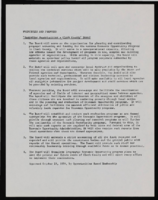Search the Special Collections and Archives Portal
Search Results
Mike Kazmierski (Economic Development Authority of Western Nevada) oral history interview conducted by Kelliann Beavers: transcript
Date
Archival Collection
Description
From the Lincy Institute "Perspectives from the COVID-19 Pandemic" Oral History Project (MS-01178) -- Business interviews file.
Text

Economic Opportunity Board of Clark County (Nev.): rosters, correspondence
Date
Archival Collection
Description
From the Clark County Economic Opportunity Board Records -- Series I. Administrative. This folder contains reports, correspondence, and rosters of the Economic Opportunity Board of Clark County, Nevada from 1964 through 1970.
Text
Janice Allen Papers
Identifier
Abstract
The Janice Allen Papers (1927-2011) are comprised of photographs, various publications, awards, a scrapbook, correspondence, memoranda, and newspaper clippings dating from 1953 to 2011 that document Janice Allen's philanthropic and political work in the state of Nevada. The materials document Allen's involvement with the Las Vegas Junior League, the Beta Sigma Phi sorority, and other volunteer work. The collection also contains correspondence received by Allen from various United States politicians. Also included are items from Allen's childhood dating to 1927 and 1928.
Archival Collection
Florence McClure Papers
Identifier
Abstract
The Florence McClure Papers (1969-2007) are comprised of writings, correspondence, newspaper clippings, handwritten notes, and assorted publications that focus on McClure's work with women's organizations, her efforts on behalf of the Southern Nevada Women's Correctional Facility, and her political advocacy work. It also contains a large number of reference clippings McClure collected on women's issues from local, national, and international publications.
Archival Collection

Transcript of interview with Christopher Maestas by Claytee White, September 14, 2008
Date
Archival Collection
Description
Christopher “Chris” Maestas (1965-2009) was an engaged educator and leader within the Chicano, Latinx, and Henderson communities. As he traced back his Latinx heritage, he explored his father’s hometown in Llaves, New Mexico, where he and his family were discriminated for their non-white demeanor; and his mother’s paternal Spanish roots; his grandfather came to work in Henderson, Nevada at the Basic Magnesium Industrial (BMI) plants during World War II. The Chicano and Spanish cultures played a significant part in defining his role within the community. For Chris, Chicanos were “people that lived in the southwestern United States particularly southern Colorado, New Mexico and northern Arizona that were originally Mexican citizens before the treaty (Treaty of Guadalupe Hidalgo) was signed and then after the treaty was signed they became Americans.” In this interview, he dives into the difference between Chicano and Spanish cuisine and gives his own tips on how to make Spanish chile relleno. Chris discussed what life was like in Henderson living in Henderson Camp when his grandfather emigrated from Spain in 1943. He described the evolution of the Henderson community in the 50s through his parents’ experiences living in the Hispanic communities of Victory Village and Carver Park. During his childhood in the early 70s, Chris recalled living in Henderson when it was known as Basic and living in a small town-site house. One of his most special recollections was from the summer of 1980, when his family purchased their first set of air-conditioning units. As a passionate teacher and 1984 alumnus from Basic High School, he advocated student engagement as Student Council Advisor. Chris was also an active member of the St. Peter the Apostle, Catholic Church, Knights of the Columbus group and LUPE (Latinos United for Perfect Equality) Club. The LUPE club promoted equality for the Hispanic community and family values. Chris described their Saturday picnics at BMI Park and the annual Henderson Industrial Days festival.
Text
Denver, John
John Denver (1943-1997) was a popular country-folk singer-songwriter of the 1970s and was also known for his work as an actor, activist, and humanitarian. His popularity brought him to many different places including the Harrah’s Lake Tahoe property, where he performed along the likes of Frank Sinatra and hosted events like the Celebrity Ski Classics.
Person
Alvarez, Paco, 1974-
Las Vegas native Brian ‘Paco’ Álvarez is an anthropologist, entrepreneur and thought leader in the arts. He holds a master’s degree in Urban Leadership from the School of Public Policy and Leadership at the Greenspun College of Urban Affairs at UNLV and a bachelor’s degree in Anthropology. Paco is the founder of two-start-ups, Psionic Art Works and Fabulous Story Tours. His passion for art and culture has been the driving force behind his career, but most importantly realizes that his passion is what drives a dynamic economy.
Person
